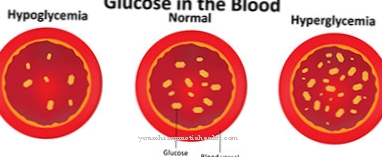Many people suffer from indefinable leaden fatigue for which no precise cause can be found. This chronic exhaustion is called Exhaustion Syndrome or Fatigue syndrome designated.
What is Fatigue Syndrome?

© Monet - stock.adobe.com
The term fatigue syndrome (French "tiredness", "exhaustion") is a collective term for a number of different complaints for which no clear cause can be found. It is considered a systemic disease. Symptoms are essentially a chronic feeling of tiredness, listlessness and persistent exhaustion, which severely limit the quality of life of those affected.
Doctors differentiate between different types of fatigue:
- Fatigue as an accompanying symptom of various chronic diseases (e.g. multiple sclerosis, Parkinson's, rheumatism, lupus erythematosus, AIDS)
- Fatigue in response to persistent sleep disorders, sleep apnea, chronic pain, bleeding anemia, thyroid disease, malnutrition, interferon treatment for multiple sclerosis, hepatitis C, various cancers, chemotherapy
- Fatigue as an independent clinical picture, for example chronic fatigue syndrome, but which must be differentiated from fatigue syndrome
causes
The exact causes of fatigue syndrome have not yet been adequately researched in detail, but in some cases triggers can be found, such as anemia, which leads to fatigue and reduced performance due to reduced oxygen supply. In many cases, the fatigue syndrome is an accompanying symptom of various chronic diseases and is therefore difficult to narrow down.
Experts often suspect not just one cause, but often a combination of various causes such as changes in the central nervous system, hormonal changes, malfunctions in the immune system, such as in autoimmune diseases and inflammation. The best researched is fatigue syndrome in cancer and its treatment.
Cancer is stressful for body and soul and weakens patients through operations, chemotherapy, radiation and bone marrow transplants, because not only degenerate but also healthy cells are destroyed by the cancer treatment. In addition, mental problems, depression and fears play a role. Side effects of medication, diet and lack of exercise can also promote fatigue syndrome.
You can find your medication here
➔ Medicines against tiredness and weaknessSymptoms, Signs & Ailments
Many sufferers complain of persistent physical and mental exhaustion for the first time after an infection. Even light exertion leads to tiredness and fatigue. Breaks do not provide real recovery and despite the persistent fatigue, sleep is not restful either, and sleep disorders can occur.
Light, everyday physical activities are perceived as strenuous and can lead to concentration and memory disorders. In addition to these symptoms, other complaints such as headache, muscle and joint pain, dizziness, swollen lymph nodes and loss of appetite can occur.
Affected people feel excessively exhausted and this exhaustion severely affects everyday life and quality of life. Many withdraw as a result. The symptoms can appear long-term and be so severe that they lead to disability in those affected.
Diagnosis & course
The diagnosis of fatigue syndrome is usually made through elimination. In the anamnesis interview, the doctor first gets a picture of situations in which exhaustion occurs, impairments in everyday life, taking medication, possible connections with caffeine, nicotine or drug consumption or stress in family, work or leisure.
Since excessive exhaustion can be an accompanying symptom of various diseases such as hepatitis, depression and various types of cancer, these diseases must first be excluded in order to be able to diagnose fatigue syndrome at all. There are as yet no sure indicators of fatigue syndrome.
However, doctors with experience of the disease can usually diagnose it quickly. For many people, the symptoms begin after an infection. Further indications for the doctor are an increase in complaints with physical or mental exertion and a duration of at least six months.
The course depends on the underlying diseases. In the case of physical complaints such as sleep disorders or anemia, the symptoms disappear after successful treatment. For cancer, how it progresses depends on the severity of the cancer and the after-effects of treatment. In some patients the symptoms subside in the long term, in some they persist.
Complications
In most cases, the patient with fatigue syndrome suffers from severe tiredness for which no cause can primarily be found. This tiredness can often not be compensated for with sleep or rest and lasts for a long time. In many cases it also leads to sleep disorders and thus to psychological problems and depression.
Due to the tiredness, it is no longer possible for the patient to organize an ordinary everyday life, as this is severely restricted in his physical activities. Many patients experience dizziness, vomiting, and nausea. Disturbances in concentration and coordination can also occur and thus impair the job being carried out.
In many cases, the fatigue syndrome is accompanied by a loss of appetite, which can lead to underweight. For the body, being underweight is a very harmful symptom. The quality of life is impaired by the fatigue syndrome, most of those affected no longer take part in social events.
In many cases cancer leads to fatigue and therefore requires primary treatment. However, this can lead to various complications and death. In addition to physical problems, psychological complaints or stress can also lead to fatigue syndrome. These must be treated by a psychologist.
When should you go to the doctor?
Anyone who suffers from chronic fatigue and exhaustion for no apparent reason may be suffering from fatigue syndrome. A doctor's visit is required if the symptoms persist for a longer period (at least four weeks) or if new symptoms appear.
Signs such as headache, muscle and joint pain or loss of appetite indicate at least a serious underlying condition. A doctor must clarify whether this is chronic fatigue syndrome. If the persistent lack of strength and listlessness noticeably restricts well-being and quality of life, a medical examination is recommended.
Fatigue syndrome mainly affects people who are in a life crisis or who are facing a particularly challenging task. A previous infectious disease can also be a trigger. Likewise, hormonal disorders and disorders of the immune system as well as nerve disorders.
It is best to consult a general practitioner if these factors apply. If there are psychological complaints, we recommend going to a therapist. In principle, lifestyle needs to be adjusted in the case of chronic fatigue syndrome - this is usually only possible with support. Therefore physical or mental changes should be examined by a doctor and treated if necessary.
Doctors & therapists in your area
Treatment & Therapy
Because of the unclear causes, there is still no therapy specifically tailored to the fatigue syndrome; medicine is pursuing different treatment approaches. For organic causes such as anemia, sleep disorders, thyroid disorders and pain, drug treatment helps in most cases.
If the diagnosis is difficult due to unclear causes or symptoms occurring in parallel, as is often the case with chronic diseases, drug and non-drug treatments are often combined with individual advice that enables the patient to cope with his everyday life in the best possible way should. The medication is tailored to the underlying disease. They are supplemented with psychotropic drugs and moderate exercise training is recommended to the patient because exercise is good for the body and soul.
In the case of fatigue syndrome, lack of exercise can turn out to be counterproductive, because taking it easy on physical fitness decreases even more, while physical exercise is a good protection. In addition, psychotherapy, especially behavioral therapy, can be useful; for cancer patients, it is best to consult a psychotherapist with experience in accompanying cancer therapy.
Outlook & forecast
Almost every oncological patient experiences lengthy phases with symptoms of fatigue syndrome during treatment. The lack of deep sleep phases in connection with frequent waking up behavior lead to decreasing muscle strength, general weakness, dizziness, listlessness and concentration problems, which in turn has a negative effect on therapy and compliance.
But only in very few cases does the fatigue syndrome persist. Many sufferers can already observe improved sleep behavior a few weeks after the end of therapy and feel better. If oncological patients maintain a regular day-night rhythm during treatment, be it cytostatic therapy, radiointervention or antibody infusion, prioritize positive activities in everyday life and ensure adequate fluid intake, fatigue after cancer treatment can be a thing of the past.
In practice, however, cases have also been documented in which those affected suffer from fatigue for months to years after the oncological treatment, sometimes manifested within a depression or as a concomitant disease of dementia degeneration. However, this is very rare, so that patients can look to the future positively, especially after cytostatic therapy, after which, in contrast to all other cancer treatments, a disproportionately high rate of fatigue syndrome can be observed.
All symptoms of severe exhaustion after metastatic cancer, chemotherapy, severe viral diseases, burnout or multiple sclerosis are symptoms of fatigue syndrome. The similarly structured Chronic Fatigue Syndrome (CFS) is a disease of its own in Germany. Depending on the trigger and physical condition, the prognosis for fatigue syndromes varies.
The fatigue syndrome cannot be improved by resting a lot or getting enough sleep. Exhaustion is triggered by complex processes in the diseased or previously damaged organism. If the malfunctions or deficiencies can be eliminated in total, the medium-term prognosis is good. Psychological support for those affected is indicated, as fatigue syndrome can be extremely stressful for those affected. It usually makes it impossible to participate in life.
The therapy of fatigue has to cover many areas. Only complex treatment approaches can improve the fatigue syndrome in the medium and long term. The disturbed inner-body control circuits include blood formation, nutrient uptake and utilization, metabolic processes and the immune system. If suitable treatment options can be found here, the fatigue syndrome can be completely cured in the long term. If this is not the case, the symptoms can at least be improved.
Some patients recover from CFS. Others are getting worse and worse. Chronic fatigue syndrome often runs cyclically and in episodes. Many patients do not fully recover.
You can find your medication here
➔ Medicines against tiredness and weaknessprevention
Since in many cases the fatigue syndrome is based on a chronic disease, targeted prevention is difficult. A healthy lifestyle with a balanced diet and regular physical activity as well as sufficient rest and sleep is generally positive. If those affected find that their physical and mental performance has decreased significantly over a longer period of time and does not improve despite taking appropriate measures, they should consult a doctor to clarify the cause.
Aftercare
Follow-up care options are very limited in the case of fatigue syndrome. Those affected are dependent on a purely sympathetic treatment of these complaints, since a causal treatment is only possible if the underlying cancer can also be treated. Self-healing cannot occur.
The focus is therefore on treating the underlying disease in order to completely limit the fatigue syndrome. As a rule, treatment is carried out with the help of medicines or surgery. When taking medication, it is important to ensure the correct dosage and regular intake in order to completely relieve the symptoms.
Likewise, a doctor should always be consulted about interactions and side effects so that there are no compilations. In the case of a surgical procedure, the patient should always rest after the procedure and take care of the body. Stressful or strenuous activities should be avoided, and sporting activities should also be avoided.
Furthermore, in the case of fatigue syndrome, a healthy lifestyle with a healthy diet generally has a positive effect on the further course of the disease. Smoking, alcohol and other drugs should also be avoided. It is also often useful to have contact with other sufferers of the fatigue syndrome.
You can do that yourself
Exercise can counteract the symptoms of fatigue syndrome. Regular exercise of endurance sports such as cycling, swimming and running increases physical performance, and the endorphins released in the process alleviate depressive moods. Exercise also creates a sense of achievement and increases self-confidence, which has a positive effect on mental balance. The training must not be too intense and must be increased slowly: Before starting, it makes sense to discuss the appropriate amount of training with the attending physician.
A balanced diet with plenty of fresh fruit and vegetables prevents deficiency symptoms; in some cases, the use of dietary supplements may be indicated. Adequate hydration is also important to keep the circulation going. Alternating showers and cold showers over the forearms also stimulate blood circulation.
In order to cope with everyday life, those affected should pay attention to the signals from their body and plan regular breaks. Keeping a diary can help to identify high-performing and low-performing phases and plan the daily routine accordingly. A short nap in the afternoon often has a performance-enhancing effect - however, it should not last longer than a maximum of 20 to 30 minutes, as otherwise the tiredness will increase. Exercise in the fresh air and regular ventilation of living and working spaces ensures an adequate supply of oxygen.



.jpg)
.jpg)
.jpg)





















